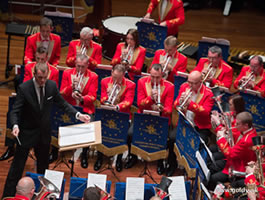To obtain two sevens with a pair of dice would require at least two rolls, probably several more. Conductor Jim Waddelow and the Raleigh Symphony Orchestra accomplished the feat in one evening in Jones Auditorium on the Meredith College campus. But these musicians did not gamble when choosing the works with which to initiate this, the orchestra’s thirty-third season. With composers like Mozart, Glinka and Beethoven, the odds were definitely in their favor.
The first of the “sevens” opened the program, Mozart’s Symphony No. 7, K. 45. Lacking the substance of the composer’s later host of symphonies, this youthful work, though, was distinctly Mozartean throughout its four movements, all the way into the cheerful Minuetto and the rapid Finale.
German composer Ferdinand David (1810-1873) produced a fine work that would not appear on anyone’s list of commonplace standards. Paul Pietrowski, principal trombonist with the orchestra, negotiated the considerable demands of that composer’s Concertino for Trombone, Op. 4, with real aplomb. The program notes (ably prepared by this journal’s own Chelsea Stith) noted that “This work demonstrates the underrated agility of the trombone…” She would doubtless have also noted the pronounced agility of the trombonist, as he produced horn-like mellow qualities throughout. A surprising bonus here was the grand orchestration from this little-known composer.
Speaking of fine orchestration, the players seemed in their element in the rousing and familiar Overture to Glinka’s opera, Russlan and Ludmilla. The authoritative attitude of players and conductor on this warhorse was infectious.
That same authoritative attitude carried over the intermission and into the magnum opus of the evening. The musicians attacked Beethoven’s Symphony No. 7, Op. 92, with apparent zeal. They obviously appreciated the magnificence of this magisterial piece, a work that would make anyone’s top ten. The listener’s confidence was solidified early in the fugal opening bars. Waddelow maintained a measured pace all the way, a pace that such a number demands. One who has been saturated by the Beethoven of, say, conductor Otto Klemperer, might have pined for a little more lingering over the closing Allegro con brio. But, hey, who’s to complain? The players sounded better than a regional orchestra “should” have sounded. Let’s put it this way: It was an ambitious undertaking by the group, but said undertaking was carried out most favorably. Anyone for whom this work is a true apex of the music world should have left Jones Auditorium fully satisfied.











